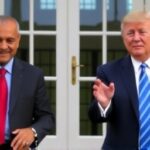In a dramatic escalation of Brazil’s political drama, former President Jair Bolsonaro was taken into full custody on Saturday, authorities citing a heightened flight risk as his high-stakes coup trial barrels forward. The move, which builds on his existing house arrest, has sent shockwaves through the nation’s capital and beyond, raising questions about accountability, justice, and the fragility of democratic institutions in South America’s largest country.
- Bolsonaro’s Shift from House Arrest to Custody Sparks Immediate Backlash
- Unpacking the Allegations at the Heart of Brazil’s Coup Trial
- International Ripples: Strains on U.S.-Brazil Relations and Regional Stability
- Street Protests and Divided Public Opinion Fuel Brazil’s Polarization
- Future Horizons: Trial Outcomes and Brazil’s Path to Reconciliation
Bolsonaro, a polarizing figure known for his far-right rhetoric and staunch support from conservative factions, has been under intense scrutiny since the January 2023 storming of government buildings in Brasília by his supporters. That event, eerily reminiscent of the U.S. Capitol riot, was widely viewed as an attempt to overturn election results and install Bolsonaro as a de facto leader. Now, with federal police acting on judicial orders, the 69-year-old ex-leader finds himself behind bars, potentially facing decades in prison if convicted of charges including sedition, conspiracy, and incitement to violence.
Bolsonaro’s Shift from House Arrest to Custody Sparks Immediate Backlash
The decision to transfer Jair Bolsonaro from house arrest to pre-trial custody came swiftly from Supreme Court Justice Alexandre de Moraes, who argued that evidence suggested the former president was actively exploring escape routes. Reports from federal investigators revealed intercepted communications and travel inquiries that pointed to a possible flight risk, prompting the judge to declare, ‘The integrity of the judicial process demands this measure to prevent any evasion of justice.’ Bolsonaro, who has denied all allegations, was apprehended at his home in São Paulo without incident, but the optics of armed agents storming a former head of state’s residence have ignited fierce debate.
Under his prior house arrest imposed in March 2024, Bolsonaro was restricted to his residence and barred from using social media or engaging in political activities. However, prosecutors argued that these restrictions were insufficient, pointing to his family’s international connections—including properties in the United States and Europe—and his history of inflammatory statements. One key piece of evidence cited was a leaked audio where Bolsonaro allegedly discussed ‘contingency plans’ should the trial turn unfavorable. This custody upgrade means Bolsonaro now resides in a high-security federal facility in Brasília, a stark contrast to the freedom he once wielded as Brazil’s commander-in-chief from 2019 to 2022.
Legal experts in Brazil have noted that such detentions are rare for high-profile figures but not unprecedented. A 2022 Amnesty International report highlighted that Brazil’s judiciary has increasingly resorted to preventive custody in corruption and political cases, with over 300,000 individuals detained pre-trial as of last year—many without formal charges. In Bolsonaro’s case, the flight risk assessment was bolstered by intelligence showing his allies arranging private jets and diplomatic overtures to sympathetic nations like Hungary and the United States under former President Trump.
Unpacking the Allegations at the Heart of Brazil’s Coup Trial
At the core of this unfolding saga is the coup trial, a sprawling legal battle that accuses Jair Bolsonaro and over 30 co-defendants of orchestrating a plot to subvert democracy following his narrow loss to President Luiz Inácio Lula da Silva in the 2022 election. Prosecutors allege that Bolsonaro, frustrated by electronic voting system disputes, rallied military leaders, far-right militias, and online influencers to stage the January 8, 2023, invasion of the Planalto Palace, Congress, and Supreme Court. The chaos resulted in widespread vandalism, injuries to dozens of police officers, and an estimated $10 million in damages, according to Brazil’s federal audit office.
Key evidence presented in court includes video footage of Bolsonaro praising the rioters on social media shortly after the event, as well as documents from the Federal Police outlining a so-called ‘Green and Yellow Operation’—a codename for the alleged coup blueprint. One damning testimony came from former Army Commander Marco Antônio Freire Gomes, who claimed Bolsonaro pressured him to declare martial law in late 2022. ‘He said the election was stolen and that the military had a duty to act,’ Gomes recounted during a May 2024 hearing, a statement that has become a cornerstone of the prosecution’s case.
The trial, which began in earnest in April 2024, has drawn parallels to other global accountability efforts, such as the prosecutions of former Peruvian President Alberto Fujimori or Myanmar’s Aung San Suu Kyi. Brazil’s Attorney General’s Office has charged Bolsonaro under Article 359-L of the Penal Code, which addresses the violent abolition of the democratic rule of law, carrying a potential sentence of up to 12 years. Additional counts of corruption and abuse of power could extend that further. As of now, the trial is in its evidentiary phase, with expert witnesses testifying on digital forensics from Bolsonaro’s Telegram channels, where he amassed millions of followers disseminating election fraud claims.
Statistics underscore the trial’s gravity: A 2023 poll by Datafolha showed 58% of Brazilians believe Bolsonaro bears responsibility for the riots, while support for his innocence lingers at 32% among his base. The proceedings are being live-streamed on the Supreme Court’s website, amassing over 5 million views per session and amplifying public engagement in what many call Brazil’s most pivotal legal drama since the end of military dictatorship in 1985.
International Ripples: Strains on U.S.-Brazil Relations and Regional Stability
The custody of Jair Bolsonaro isn’t just a domestic affair; it’s reverberating across borders, particularly straining U.S.-Brazil relations at a delicate time. The Biden administration, which has prioritized democracy promotion in Latin America, issued a measured statement Saturday supporting Brazil’s judicial independence but avoiding direct commentary on Bolsonaro. ‘We respect the rule of law in our partner nations,’ White House Press Secretary Karine Jean-Pierre said, though behind-the-scenes sources indicate concerns over Bolsonaro’s potential extradition bids if he were to flee northward.
Bolsonaro’s close ties to Donald Trump—evident in their 2019 White House meeting and shared ‘America First’ ideologies—have long positioned him as a bridge between conservative movements in both countries. Recent reports from The New York Times revealed that U.S.-based evangelical groups, which funneled millions into Bolsonaro’s campaigns, are now lobbying Congress to intervene, citing human rights concerns. This comes amid broader regional instability: Venezuela’s ongoing crisis and Argentina’s libertarian shift under President Javier Milei have already tested the Organization of American States’ cohesion.
Economically, the news has implications too. Brazil’s stock market dipped 1.2% on Monday following the announcement, with analysts at Itaú Unibanco attributing the volatility to fears of political unrest disrupting trade. The U.S., Brazil’s second-largest trading partner with $88 billion in bilateral goods last year, could see tensions if Bolsonaro’s allies portray the custody as ‘political persecution’—a narrative gaining traction on platforms like X (formerly Twitter), where #FreeBolsonaro has trended globally with 2.5 million posts.
Regionally, leaders like Colombia’s Gustavo Petro have voiced solidarity with Lula’s government, emphasizing the need to ‘defend democracy from authoritarian remnants.’ Meanwhile, a joint statement from the Mercosur bloc called for calm, warning that prolonged instability could jeopardize the bloc’s $500 billion annual trade volume. Experts from the Council on Foreign Relations predict that if the trial drags into 2025, it could embolden populist movements elsewhere, from Mexico to Chile, where anti-establishment sentiments are rising.
Street Protests and Divided Public Opinion Fuel Brazil’s Polarization
On the streets of Brasília and São Paulo, the custody decision has ignited a firestorm of protests, with Bolsonaro’s supporters clashing with pro-government demonstrators in scenes reminiscent of the 2022 election aftermath. Thousands gathered outside the federal prison on Sunday, waving Brazilian flags and chanting ‘Bolsonaro is innocent!’ Police used tear gas to disperse crowds after reports of thrown projectiles, resulting in 15 arrests and minor injuries, per local media.
Public opinion remains deeply split. A fresh Ipsos survey released Tuesday shows 45% of respondents view the custody as necessary to ensure trial fairness, up from 38% last month, while 40% see it as judicial overreach targeting political opponents. Among Bolsonaro’s evangelical base, which comprises about 30% of Brazil’s 215 million population, support hovers at 70%, with pastors like Silas Malafaia decrying the move as ‘persecution of the faithful.’
Women’s rights groups and indigenous activists, who faced Bolsonaro’s deregulatory policies during his presidency—leading to a 20% spike in Amazon deforestation—have rallied in counter-protests. ‘This is justice long overdue for a leader who incited violence against our democracy,’ said Sonia Guajajara, Brazil’s Minister for Indigenous Peoples, in an interview with Globo News. Social media amplifies these divides: TikTok videos of the arrest have garnered 50 million views, blending factual reporting with conspiracy theories about ‘deep state’ involvement.
The polarization extends to cultural spheres, with Brazilian musicians and artists boycotting events tied to Bolsonaro sympathizers. A notable incident involved funk singer MC Poze do Rodo canceling a show after backlash for past Bolsonaro endorsements, highlighting how the ex-president’s influence permeates pop culture.
Future Horizons: Trial Outcomes and Brazil’s Path to Reconciliation
As Jair Bolsonaro settles into custody, the coup trial’s trajectory could redefine Brazil’s political future. Legal timelines suggest a verdict might not arrive until late 2025, given the volume of evidence—over 1,000 documents and 200 witnesses. If convicted, Bolsonaro faces not only imprisonment but a ban from public office, potentially sidelining his 2026 presidential ambitions and fracturing the right-wing coalition that propelled him to power.
Looking ahead, reconciliation efforts are underway. President Lula has proposed a national dialogue commission to address election distrust, drawing on models from post-apartheid South Africa. International observers, including the Carter Center, are monitoring the trial for fairness, with their preliminary report praising transparency but urging protections against witness intimidation.
Economically, stability hinges on the trial’s resolution. Brazil’s GDP growth, projected at 2.5% for 2024 by the IMF, could falter if unrest escalates, impacting global commodities like soy and iron ore, which account for 40% of exports. For U.S.-Brazil ties, mending fences will require navigating the custody’s fallout—perhaps through enhanced cooperation on climate and trade under the Amazon Fund.
Ultimately, this chapter tests Brazil’s democratic resilience. As one analyst from Fundação Getulio Vargas put it, ‘The custody of Bolsonaro is a litmus test: Can Brazil hold its leaders accountable without descending into chaos?’ With midterm elections looming in 2026, the nation’s eyes are fixed on the courtroom, where the stakes for regional democracy—and beyond—could not be higher.








